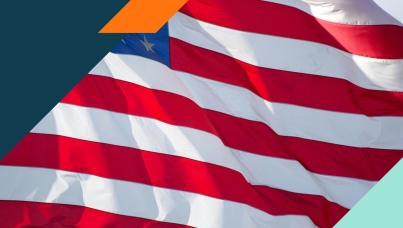Nearly two in five Americans have a New Year’s Resolution planned for 2021
Washington, DC, December 3, 2020 — A new Urban Plates/Ipsos poll finds that nearly two in five Americans have a resolution planned for 2021, including 18% who say they have multiple resolutions planned. Among those with resolutions planned for next year, working out/being more active is the most common goal, followed closely by goals focused on eating healthier and improving finances. Nearly three quarters of those planning a resolution say that COVID-19 has had an impact on what their resolution will be, with at least one in four saying they will focus more on mental health, eating healthier, and/or their finances as a result of the pandemic.
Detailed Findings
Nearly two in five (38%) Americans already have a resolution planned for 2021, with 20% saying they are focusing on one goal and another 18% saying they have multiple. A similar proportion (36%) say that they had a resolution for 2020.
- Those most likely to have a resolution planned for 2021 include younger adults (59% of those aged 18-34 vs. 19% of those aged 55+), parents (54% of those with children living at home vs. 33% of those with no kids), and those who had a resolution for 2020 (86% vs. 11% of those who did not).
- Results are on par with those from a survey conducted in 2019, where 36% of adults said they had set a resolution for that year and 38% who had planned a New Year’s resolution for 2020.
- Among those planning a resolution for 2021, most say that COVID-19 has had an impact on their resolution, including more than a quarter who say the pandemic has made them want to focus more on mental wellness (29%), eating healthier (28%), and/or focus more on financial goals (27%). Another 23% say COVID has made them focus more on other health related goals such as quitting smoking, decreasing alcohol, and sleeping more, while other mentions fall below this threshold. On the other hand, 27% among this group say that COVID-19 has not impacted their 2021 resolution(s).
Among those who have a News Year’s Resolution for next year, boosting physical health is the top theme, with 55% saying they plan to work out/be more active in the year ahead. Just under half plan to focus on eating healthier (47%) and/or focus on their finances (45%, save more money, buy a house, pay-off debt, etc.). These were also the top three resolutions in 2019.
- Losing weight (42%) and mental wellness (41%) round out the top five, while bolstering social connections (34%) and skill development (24%) are mentioned by at least a quarter.
- Several differences exist across gender, with women significantly more likely to describe their 2021 resolutions as being focused on finances (54% vs. 38% of men), losing weight (49% vs. 36%), and mental wellness (54% vs. 29%). More than half of those under the age of 35 also report that their New Year’s resolution will concentrate on mental wellness (51% vs. 33% of those aged 35 and over).
- When asked how long they kept their 2020 New Year's Resolution, just over half (55%) of those who made a resolution did not keep it for the entire year - including one in ten (11%) who kept it for less than a month. These results are similar to those seen in 2019 where 56% did not complete their resolution. On the other hand, 45% say that they are still working on their resolution(s) or have reached their goal(s) already, and this is especially true for older adults (61% of those aged 55+).
- Among those who did not keep their 2020 resolution, losing motivation stands out as the top reason for not following through (35%, down from 45% in 2019). Roughly one in five cite being too busy (19%) or changing their mind (18%) as reasons why they did not keep their 2020 resolution, while one in ten (11%) feel they did not have the support they needed to be successful. Another 11% mention some other reason (up significantly from 4% in 2019) while 5% simply don’t know why they didn’t keep it.
About the Study
These are the findings from an Ipsos poll conducted November 5 - 6, 2020 on behalf of Urban Plates. For the survey, a sample of 1,005 adults ages 18 and over from the continental U.S., Alaska and Hawaii was interviewed online in English.
The sample for this study was randomly drawn from Ipsos’ online panel (see link for more info on “Access Panels and Recruitment”), partner online panel sources, and “river” sampling (see link for more info on the Ipsos “Ampario Overview” sample method) and does not rely on a population frame in the traditional sense. Ipsos uses fixed sample targets, unique to each study, in drawing a sample. After a sample has been obtained from the Ipsos panel, Ipsos calibrates respondent characteristics to be representative of the U.S. Population using standard procedures such as raking-ratio adjustments. The source of these population targets is U.S. Census 2018 American Community Survey data. The sample drawn for this study reflects fixed sample targets on demographics. Posthoc weights were made to the population characteristics on gender, age, race/ethnicity, region, and education.
Statistical margins of error are not applicable to online non-probability polls. All sample surveys and polls may be subject to other sources of error, including, but not limited to coverage error and measurement error. Where figures do not sum to 100, this is due to the effects of rounding. The precision of Ipsos online polls is measured using a credibility interval. In this case, the poll has a credibility interval of plus or minus 3.5 percentage points for all respondents. Ipsos calculates a design effect (DEFF) for each study based on the variation of the weights, following the formula of Kish (1965). This study had a credibility interval adjusted for design effect of the following (n=1,005, DEFF=1.5, adjusted Confidence Interval=+/-5.0 percentage points for all respondents).
For more information on this news release, please contact:
Negar Ballard
Director, US
Public Affairs
[email protected]
Marie-Pierre Lemay
Director, US
Public Affairs
[email protected]
About Ipsos
Ipsos is the world’s third largest market research company, present in 90 markets and employing more than 18,000 people.
Our passionately curious research professionals, analysts and scientists have built unique multi-specialist capabilities that provide true understanding and powerful insights into the actions, opinions and motivations of citizens, consumers, patients, customers or employees. We serve more than 5000 clients across the world with 75 business solutions.
Founded in France in 1975, Ipsos is listed on the Euronext Paris since July 1st, 1999. The company is part of the SBF 120 and the Mid-60 index and is eligible for the Deferred Settlement Service (SRD).
ISIN code FR0000073298, Reuters ISOS.PA, Bloomberg IPS:FP www.ipsos.com



